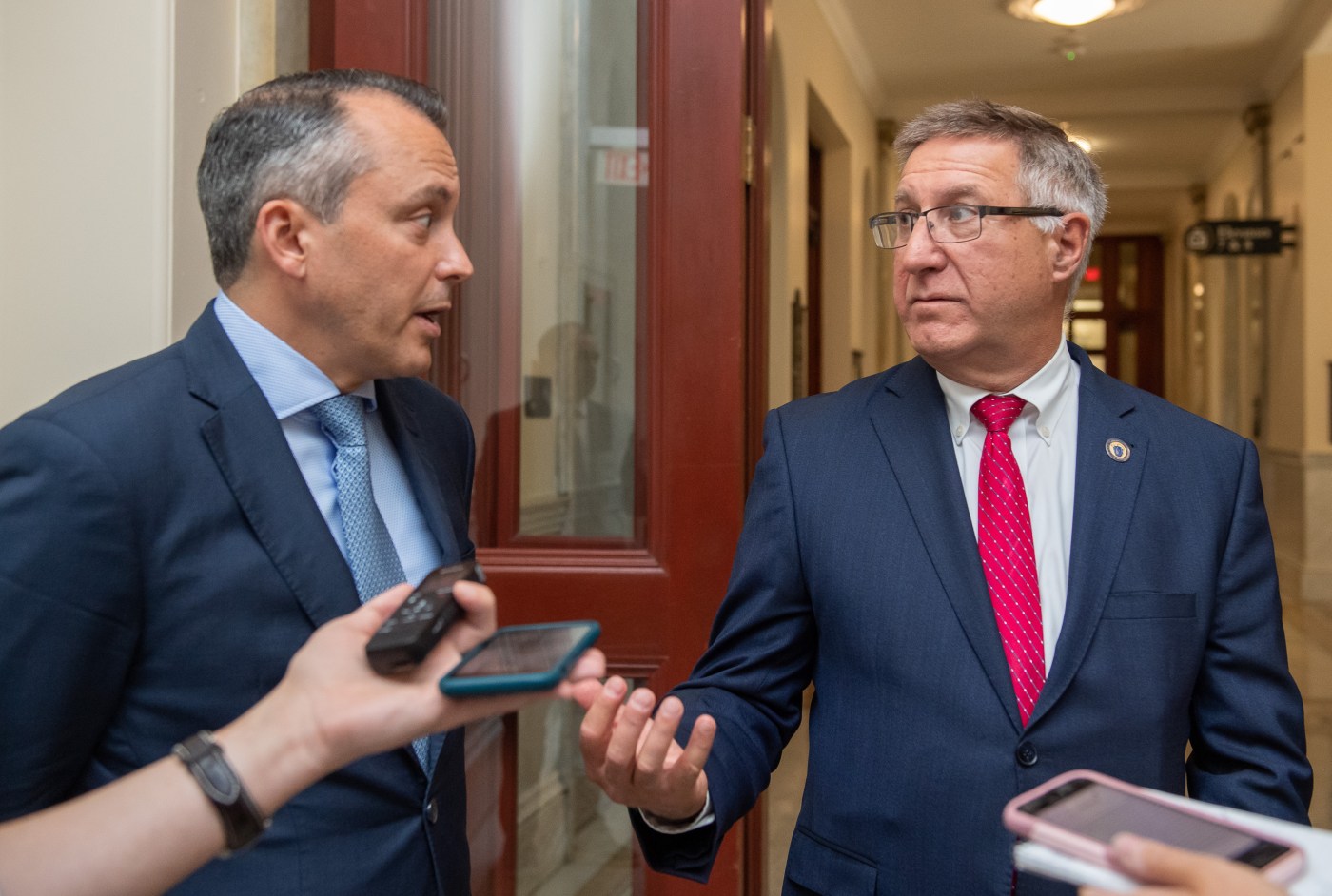
Massachusetts will start new fiscal year without state budget in pace for 14th straight year
Massachusetts will start fiscal year 2025 Monday without a full spending in place for the next 12 months, marking the 14th straight year Beacon Hill has failed to meet its annual deadline for the only bill they are constitutionally required to produce.
Lawmakers in both the House and Senate adjourned for the week Thursday night without advancing to Gov. Maura Healey a compromise on two roughly $58 billion proposals that have been tied up in secret discussions for the past month.
As he walked out of the Senate Chamber Thursday night, Senate budget chief Michael Rodrigues said “we are so close” to a deal.
“We’ve been working really hard, in regular communications. But the important thing is, is we’re going to get it done right, and it’s going to be a good budget that everyone can be proud of,” he told the Herald just after 11 p.m. as the branch debated a borrowing bill focused on housing.
House Ways and Means Chair Aaron Michlewitz, at top budget negotiator, said Wednesday that he had hoped to meet the deadline but was “not too concerned about the impacts” of missing it.
“We all want to get it done by July 1,” he told reporters. “But we also have important initiatives on both sides that we care about and that our members care about and that they voted for, and we want to make sure that we can see those to fruition as best as possible.”
The two budget proposals from the House and Senate have similar bottom lines but diverge in key areas like how the state should spend $1.3 billion in revenue from a 4% surtax on incomes over $1 million commonly referred to as the “Millionaires Tax” or “Fair Share Amendment.”
Lawmakers also differ in policy such as a Senate push to spend $117 million to make community college free by covering tuition and fee costs for all students starting this fall and a separate House effort to shuttle hundreds of millions to the MBTA.
Massachusetts has not started a new fiscal year with a budget in place by July 1 since 2010, when lawmakers were able to hand over a $27 billion budget on June 24 that then-Gov. Deval Patrick signed into law on June 30.
The Bay State is also one of only a handful of states in the country that will not have a spending plan in place by the start of its new fiscal year, according to a tally kept by the National Conference of State Legislatures.
House Speaker Ron Mariano said one reason budgets are often delayed here is because no one wants to give up their position during negotiations “until they’re faced with the inevitable result that they’re not going to prevail.”
“So you hang in there and you make your arguments repeatedly. Having done tons of conference committees, you hate to surrender, and that’s just the nature of the negotiations,” the Quincy Democrat said Wednesday, referring to the formal name of the group negotiating the budget.
Rep. Todd Smola, the ranking Republican on the House’s budget-writing committee, said Wednesday that negotiators were “very close” to a budget deal and lawmakers want to “make sure that we get it done correctly.”
“That negotiation is very challenging sometimes, lots of different proposals where we have to make everything line up,” he said.”I definitely would like to see it done on time. But that doesn’t always happen. It hasn’t happened in years past.”
Related Articles
Gov. Maura Healey bans migrants from sleeping at Boston’s Logan Airport as overflow site opens
Uber, Lyft agree to boost wages, shell out $175M to settle lawsuit brought by state
Senate beats back last-minute efforts to approve real estate transfer fee in borrowing bill
Gov. Healey defends trip to southern border, MassGOP calls it ‘publicity stunt’
Renaming Seaport convention center after Thomas Menino a ‘terrific idea,’ Jim Rooney says
Experts who spoke to the Herald earlier this month said there is little immediate impact if a budget is late, though new programs cannot start and expansions to existing ones are put on hold. Cities and towns that rely on state aid are also left in limbo while Democrats work toward a final deal.
Rodrigues said last week that he would like to produce an on-time budget, but “as far as a practical point or substantive point, it really doesn’t matter.”
“It’s more of a point of pride. I would like for my own personal pride to be able to successfully complete the budget negotiations by July 1. But pride aside, nothing really happens or changes,” he said.
Gov. Maura Healey offered lawmakers more time this cycle to come to an agreement when she filed a $6.9 billion interim plan last week that covers spending through July 31. Both the House and Senate quickly accepted the extension and shipped the bill back to Healey.
It is the third time Healey has had to file a temporary spending plan because the House and Senate could not produce a budget deal by the time the fiscal year started. But governors over the years have routinely filed one-twelfth budgets to keep state government from shutting down.
After an unrelated event Wednesday, Healey said the July 1 deadline “absolutely” means something.
“I know that people are hard at work. We’ve seen a lot of movement the last couple weeks. The Legislature is hard at work on a number of pieces of legislation, including the budget. So I hope we see something soon,” she said.
Senate Minority Leader Bruce Tarr said on-time budgets matter to the people who look to Beacon Hill for “fiscal discipline and the orderly operation of government.”
“And while it’s certainly understandable that at times, it takes us some time to resolve complex matters, it’s certainly important to have a deadline to drive decisions, to drive stability, and to meet the expectations of folks who expect us to do things in a timely way,” he told the Herald.


